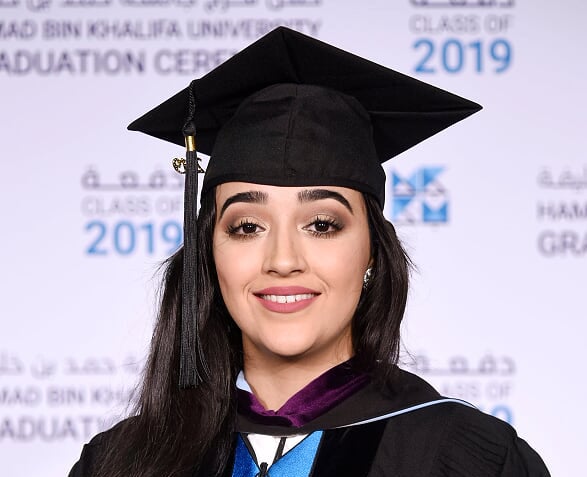Situated learning with an international focus complements classroom education at HBKU’s College of Law.

A year ago, Wafa Trad (JD ‘19) had just completed the second year of her studies at HBKU’s College of Law. During the summer of 2018, she had the privilege of participating in the Hague Academy of International Law, a three-week intensive course on international law. While in The Hague, she visited the International Court of Justice (ICJ), the principal judicial organ of the United Nations, which is housed in the Peace Palace.
Visiting the ICJ was life-changing for two reasons. First, Trad happened to be at the ICJ when it was hearing the request for provisional measures in the case of Qatar vs. the United Arab Emirates, which resulted in the ICJ’s order in favor of Qatar.
Second, the ICJ visit was a precursor to Trad’s participation in the Philip C. Jessup International Law Moot Court Competition in Washington, D.C., in April 2019. The Jessup competition, in which more than 700 law schools from more than 90 countries compete, is an opportunity for university teams to present and simulate real-life legal cases.
To prepare for the competition, Wafa and her teammates “spent months researching, understanding facts, studying relevant sources of international law, including treaties, and rehearsing our oral argument,” said Trad, who completed her undergraduate studies in political science.
“This was a once-in-a-lifetime opportunity to represent HBKU and the education sector of Qatar, in general, as hundreds of well-established universities participate in the Jessup competition every year.”
One of the oldest and most prestigious international moots, the Jessup competition represents a microcosm of proceedings that are typically before the ICJ, in which a hypothetical case is presented to a panel of three judges, as opposed to the full court of 15.
For graduates such as Trad, international experience contributed significantly to her overall understanding of the law.
“My experience in The Hague was full of theoretical and practical knowledge. It included visits to different international organizations and institutions; in addition to the ICJ we visited the International Criminal Court (ICC) and the Organization for the Prohibition of Chemical Weapons. I also had the chance to visit the Tunisian Embassy in The Hague and meet the Tunisian Ambassador, which was memorable and poignant given my family background,” she said.
More importantly, the out-of-classroom experience helped Trad develop an independent set of values, backed in part by her College of Law education. “While at the College of Law, I met a lot of people outside of the classroom. They gave me solid advice on my future academic and career options. The one-on-one meetings and conversations were extremely valuable given the individuals’ accomplishments in international law,” said Trad.
Her learning also shaped her understanding of justice, as well as its processes and prerequisites.
“Before defining justice, two things must be kept in mind: justice is different from equality, as equality will not always lead to justice; and justice is relative -- what may be deemed just in one country may be unjust in the other. But generally, I think the path to justice is not that simple. Justice is achieved when everyone gets what they deserve -- nothing more and nothing less,” she said.
“However, this equation will almost definitely fail if the precondition of ‘equal opportunities’ is not met. In fact, unequal opportunities have been long identified as the biggest barrier to justice.”
Concepts of political and economic justice, Trad believes, should be framed within this broader definition.
“Political justice requires an additional element of political control, power or influence. In theory, this kind of justice requires everyone to have the same degree of influence. However, this sounds largely impractical and borderline impossible. Political justice is best understood as the entrustment of political power to a certain person or group, and ensuring that they are not disproportionately powerful in a way that will disadvantage other groups,” said Trad.
Trad and her JD classmates represent a growing generation of thought-leaders whose academic and professional strides contribute to the collective framework of the Qatar National Vision 2030. As an alumna, she joins a distinguished group of graduates of the College of Law who have become highly successful in their chosen paths.
The College of Law’s JD program is the only of its kind in the MENA region, offered primarily to support the strategic ambitions of the State of Qatar and help prepare the next generation of aspiring legal experts.
This past May, the College of Law introduced two new academic offerings – the LLM Degree in International Law and Foreign Affairs and the LLM Degree in International Economic and Business Law – both designed to cross the boundaries of single-discipline studies. Applicants may now apply to the new programs via admissions.hbku.edu.qa.
Wafa Trad is joining a growing network of HBKU alumni who are shaping tomorrow. Find out more by visiting cl.hbku.edu.qa.





